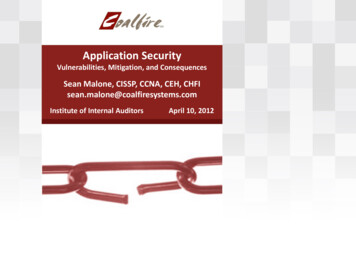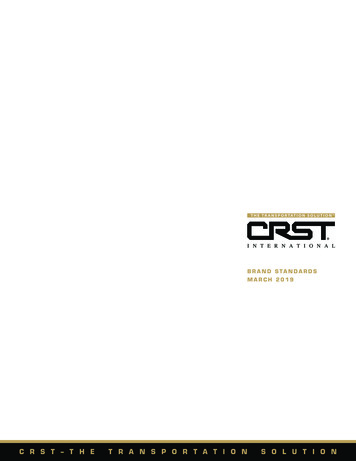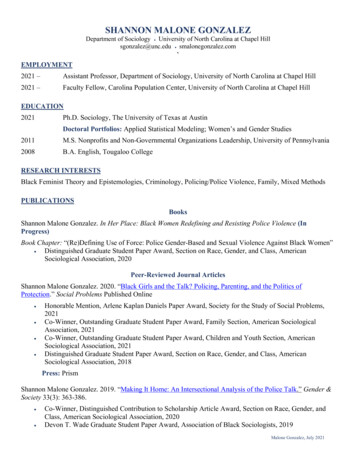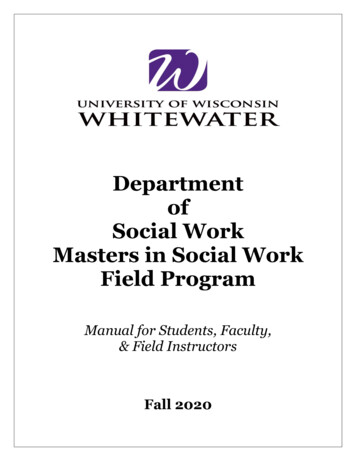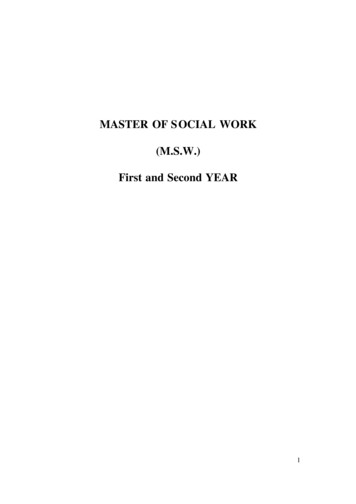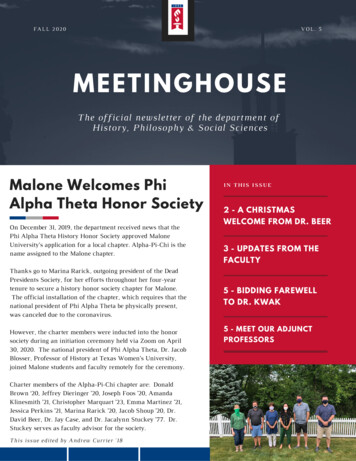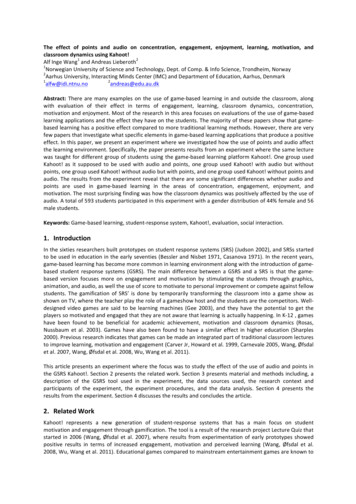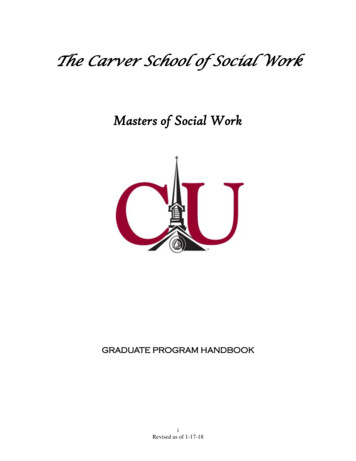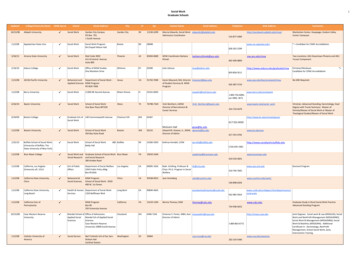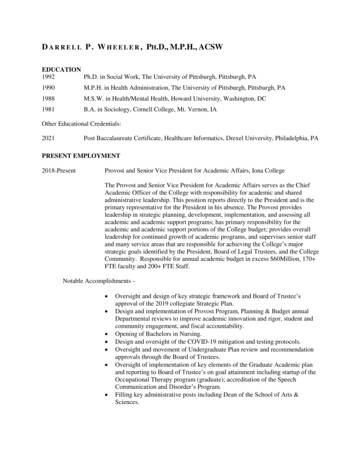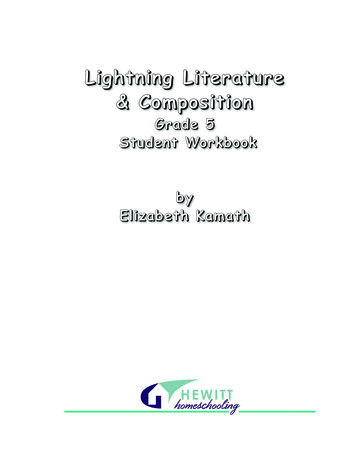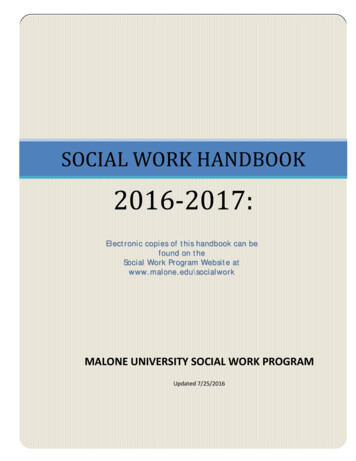
Transcription
SOCIAL WORK HANDBOOK2016-2017:Electronic copies of this handbook can befound on theSocial Work Program Website atwww.malone.edu\socialworkMALONE UNIVERSITY SOCIAL WORK PROGRAMUpdated 7/25/2016
Table of ContentsPURPOSE OF THIS HANDBOOK . 2HISTORY OF SOCIAL WORK . 2OHIO STATE SOCIAL WORK LICENSURE . 2CAREERS IN SOCIAL WORK. 3MALONE UNIVERSITY AND SOCIAL WORK . 3CONNECTING CURRICULUM AND COMMUNITY . 4SOCIAL WORK EDUCATION. 6The Generalist Social Work Perspective: . 6WHY Do Social Workers Do This Work? . 6HOW Does Social Work Do This Work? . 6Social Work’s Distinctive Feature Among the Helping Professions . 7The ‘Micro-Macro’ Dichotomy . 7SOCIAL WORK AND THE LIBERAL ARTS . 7Liberal Arts Content and the Social Work Curriculum . 8Generalist Social Work Practice . 9SOCIAL WORK PROGRAM MISSION STATEMENT . 10SOCIAL WORK PROGRAM GOALS . 10SOCIAL WORK PROGRAM STUDENT LEARNING COMPETENCIES . 10EVALUATION MECHANISMS . 11MALONE UNIVERSITY SOCIAL WORK CURRICULUM . 11General Education Requirements . 11Required Support Courses . 12Social Work Courses. 12Overview of Curriculum Hours . 16DIVERSITY AND SOCIAL WORK . 16APPLICATION TO THE MAJOR. 16COURSE PERFORMANCE . 18APPLICATION TO FIELD WORK . 19TRANSFER POLICY . 19STUDENT INFORMATION ON FILE . 20ACADEMIC GRIEVANCE PROCEDURE . 20Informal Process . 20Formal Process . 21ACADEMIC PETITION . 28ACCESSIBILITY SERVICES – DISABILITY ACCOMMODATIONS STATEMENT . 28COMPLETION OF WORK . 29ADVANCED PLACEMENT: ACADEMIC CREDIT THROUGH EXAMINATION . 29STUDENT ACCOUNTABILITY . 29TERMINATION FROM THE PROGRAM . 30FACULTY ACCOUNTABILITY . 32NASW CODE OF ETHICS . 321
OHIO CODE OF ETHICAL PRACTICE AND PROFESSIONAL CONDUCT . 32SOCIAL WORK PROGRAM POLICY ON ACADEMIC WRITING . 33APA Format . 33SOCIAL WORK STUDENT ASSOCIATIONS . 33FULL-TIME FACULTY INFORMATION . 34Professor Jane Hoyt-Oliver, Ph.D., ACSW, LISW-S, . 34Associate Professor Elizabeth Patterson Roe, MSW, LISW-S. 34Associate Professor Karen Slovak, Ph.D., LISW-S. 35MALONE UNIVERSITY AND SOCIAL WORK ACCREDITATION AGENCIES . 36APPENDICES . 38Appendix I: Educational Policy and Accreditation Standards . 39Appendix II: Malone University Identity and Mission Statement . 55Appendix III: Information Release Form . 56Appendix IV: Malone University Reference Form . 572
PURPOSE OF THIS HANDBOOKThis handbook describes the purposes, policies and procedures of the social workprogram at Malone University.Malone University is proud to have a social workprogram that has been accredited by the Council on Social Work Education since1984. An introduction to social work values and fields of practice is described in thishandbook, as well as courses required to receive a bachelor’s degree in social work.This handbook also includes both the procedure for acceptance into the major andthe requirements for a student to remain in good standing within the program.READ IT CAREFULLY !!!. This handbook offers majors and those considering socialwork as a career, a picture of this demanding profession. Students are encouragedto critically evaluate the fit between their personal values, abilities and interests, andthis profession.Feel free to explore your questions with social work faculty.Faculty names and contact numbers are listed under faculty information in thishandbook.HISTORY OF SOCIAL WORKSocial Work, as a profession, is over 155 years old. Although in every culture therehave always been efforts to help vulnerable people, social work in America traces itsorigins to the American Social Science Association, founded in 1865, and theConference on Charities, founded in 1879. In this country, Social Work traditionallyhad two approaches in its work—helping people improve their abilities to function ina changing culture, and working for improvement of the country’s social, political andeconomic policies and laws which impact people’s lives.Mary Richmond’s, Social Diagnosis, published in 1917 was instrumental in movingSocial Work along its path of professionalization. The Charity OrganizationSocieties and those working within the Friendly Visitor Program focused on “peoplechanges.” The Settlement House Movement worked for just policies and improvedcommunity life, such as child labor laws and labor conditions in general, women’ssuffrage, ethnic and racial discrimination, voting issues and educational reform.These remain important foundations for social work practice theory. Empoweringvulnerable people to make changes in their lives and work on the local, state andnational level to create a more just society are a bedrock of concern in theprofession.OHIO STATE SOCIAL WORK LICENSUREIn July 1984, Ohio Governor Richard Celeste signed into law Amended SubstituteHouse Bill 205. This bill requires licensure for anyone being paid to practice socialwork and for all paid positions with the title of Social Worker. It also requireslicensure for all counselors, as well as Marriage and Family Therapists. The lawcreated the State of Ohio Counselor and Social Worker Board. The Ohio Legislaturemodified the law by enacting SB 223 in 1996, and again in 2003. The Board nowgoverns professional practice for social workers, counselors and marriage and familytherapists. Social Workers and Counselors must abide by the Ohio Code ofProfessional Conduct (OAC4757-5-01)2
In April of 2014, the Ohio Legislative Assembly passed House Bill 232. This billrequires that any person who has the title “social worker” must be licensed in thestate of Ohio. It removed an exemption for civil service employees that had been inplace since the law was initially passed, with very few exceptions. To be licensed,social workers must graduate from a program accredited by the Council on SocialWork Education.Social Work licensure is a two-step process. Eligibility is initially based on theapplicant’s academic training. Graduation from a CSWE accredited program insocial work is required. In addition, the applicant must pass the licensing exam.This exam is offered every other week at testing centers throughout Ohio. Theexam is composed of multiple choice items that cover a wide range of social worktheory, practice skills and professional issues. The exams are scored through acomputerized program with a score of 70% needed to receive licensure. If onepasses the exam, one may call him/herself a social worker within the state of Ohio.If one does not pass, it is possible to take the exam again after a period of severalweeks.Social workers practicing without a current license will be fined and/or will bepenalized under Ohio law. It is a 4th degree criminal misdemeanor to practicewithout a license. Such cases are handed over to the county prosecutor for criminalprosecution, and usually involves a fine and criminal conviction. Agencies thatdisobey this law may also face fines and other sanctions.CAREERS IN SOCIAL WORKSocial work is extremely diverse in its practice arenas and people with whom itworks. Graduates of baccalaureate programs most often find jobs as entry levelworkers in the areas of child welfare, family services, school-based programs,programs for individuals with developmental disabilities, mental health concerns,juvenile justice, and services for the elderly. Careers in health care services andsubstance abuse programs are also available.MALONE UNIVERSITY AND SOCIAL WORKMalone University is a four-year liberal arts institution affiliated with the EvangelicalFriends Church. The EFC is one of several groups that identify with the rich Quakerheritage. Malone was founded in l892 as Cleveland Bible College by Friendscouple, Walter and Emma Malone. At that time, it was located in Cleveland, Ohio.The College moved to Canton Ohio in l957, changed its name in honor of itsfounders to Malone University, and became a four-year liberal arts University.Social Work is a natural major to provide for students of Malone University. Walterand Emma Malone, the University’s founders, were actively involved in providingdirect services to Cleveland’s poor (shelter, food and education). Malone’s SocialWork Program began in 1978 and received initial accreditation by the Council onSocial Work Education in 1984. The program was fully accredited in 1992, andreaffirmation was successfully completed in 2001, 2008, and 2016. The Malone3
University Social Work Program is fully accredited and will come up again forreaffirmation in June, 2024.This bit of history is important for several reasons. Malone University’s statedmission is “to provide students with an education based on biblical faith inorder to develop men and women in intellectual maturity, wisdom, andChristian faith who are committed to serving the church, community, andworld.” Malone University’s social work program believes that maturity, wisdom,integrity and service are several of the critical attributes needed to become a socialworker. The religious orientation of the University attracts a large number of studentswho hold to a Christian worldview, but over 30% of students do not have a religiousaffiliation. Malone emphasizes a liberal arts education that requires a commitmentto free inquiry and an exposure to the diversity and richness of human life. Studentswho graduate from Malone are prepared to integrate faith and embrace a changingand pluralistic world. Malone University has an open admissions policy to allacademically qualified people who are willing to follow the school’s Student Code ofConduct and the Community Agreement. Malone University does not discriminateon the basis of religious or political orientation, age, race, ethnicity, or gender.“Malone University, as a learning community committed to biblical principles, seeksto value and reflect the diversity in God's creation. Therefore, we are committed topromoting inclusive excellence and furthering our understanding of diversity as welive out our mission and educational goals.” (excerpt from Malone UniversityDiversity and Inclusion Statement)CONNECTING CURRICULUM AND COMMUNITYMalone University is situated in Canton, OH. This is a city of 73,000 people situatedwithin an increasingly urban county. The city was founded over 200 years ago as atrade post for manufactured goods and agricultural products. It was well served byboth rail and road. In its first century, Canton relied heavily on the development ofheavy industry. It flourished during the early half of the 20th century and becameknown as the home to several large manufacturing firms.In the year 2012, Ohio County Profiles indicate that 14.9% of all Stark Countyhouseholds have incomes that are below the poverty line. In 2014, theunemployment rate within Stark County was 5.6% (as compared to Ohio’s rate of5.5% and a national rate of 6.1% (http://ohiolmi.com/asp/laus/LAUS.asp). In 2010the median household income within the city was 30,043 (www.areavibes.com).The counties to the South and West of Stark County remain primarily ruralcommunities. Columbiana and Carroll Counties, to the southeast, retain a significantrural culture although the shale oil boom (as well as its current slowdown) haveeffected these counties significantly. Tuscarawas County, directly south, is thenorthernmost county of the Ohio Appalachian Communities. Holmes and WayneCounties, to the west, contain some of the richest farmland in the United States andis home to many Amish and Conservative Mennonite communities. Summit Countyand Portage counties, to the north, are more urban and industrialized. Mahoning4
County, directly east of Stark County boasts a number of cities, but has also sufferedgreatly since the collapse of Big Steel in the 1980’s.Many neighborhoods within the city limits are seen as historically distinct by theirresidents: several have neighborhood associations which assist with communityevents and efforts toward community building. These associations have playedimportant roles as the city population has shrunk and community culture haschanged.Canton is the largest of three cities within Stark County. The total county populationin 2012 was 374,868 l.) The twoother cities within Stark County limits are Alliance, to the east of Canton, andMassillon to the west. Townships and unincorporated villages can be found withinthe county. Although there has been significant growth in many formally ruralcommunities within the county, some areas retain a distinctive and often more ruralnormative culture. Both types of community have distinct histories, activities andconcerns. Social service organizations such as The United Way, Urban League andseveral social service agencies serve the entire community. School rivalries andcommunity events forge a sense of uniqueness for neighborhood members.The Social Work program at Malone utilizes this urban learning context, as well asthe surrounding, more rural community and international platform to assist studentsto understand and utilize generalist skills. The program emphasizes training studentsto utilize techniques that emphasize strengthening person–in-environment fit. Theprogram seeks to produce entry-level generalist social workers that are able torecognize individual resilience and empower those served toward optimalfunctioning within their social context.The county social service providers endeavor to bring services to many differentgroups and individuals. In many cases, these providers work well together,cooperatively seeking to find creative solutions to complex problems in anincreasingly difficult fiscal environment. Social work majors have a wide variety ofopportunities to observe and practice generalist skills throughout the community.Sophomore field placement and accompanying classroom discussions provide acontext for generalist practice. Juniors are involved with community developmentwork in the poorest neighborhoods within the community. Seniors are provided withopportunities to develop and practice generalist skills in the context of their seniorinternship: a comprehensive 30-hour p/week (450 hour total) commitmenttraditionally entered into in the spring of senior year.Starting with Introduction to Social Work, all of social work’s core courses bring thecommunity into the classroom or provide opportunities for students to interact withthose living in Canton’s and surrounding neighborhoods. Guest speakers, peoplefrom the professional community as well as community residents, frequent Malone’ssocial work classes. Students are encouraged to attend professional events both on5
and off campus and to re-enforce this learning through book clubs and othercommunity engagement.SOCIAL WORK EDUCATIONMalone’s Social Work Program is designed to address three issues facing socialwork education:1. Articulating and communicating a uniform definition of generalist practice2. Building on the liberal arts3. Connecting curriculum with community.The Generalist Social Work Perspective:Generalist practice is grounded in the liberal arts and the person and environmentconstruct. Generalist social work empowers individuals, families, groups andcommunities to protect, enhance and create relationships that foster the profession’ssix core values: competency, service, caring relationships, personal uniqueness andworth, social justice and integrity towards the goals of fostering people’s well-beingand freedom of choice. (Adapted from CSWE 2008, Reamer 1982)Social Work’s emphasis on person-in-environment fit sees people’s strengths andtheir concerns within the context of their social functioning. As people identifystrengths and relate them to their concerns, they strengthen relationship-buildingskills, improve social functioning, and are in a position to contribute to the building ofcommunity.Social Work’s holistic, theoretical, orientation suggests THREEFUNCTIONS social workers are trained to do: (1) help people make personalchanges, (2) link people to resources, and (3) help people to initiate changes insocial policies, laws, and institutions which impact their lives. Social Work facilitateschange, helps build strengths, and empowers people to solve problems.WHY Do Social Workers Do This Work?As a profession, Social Work claims six core values: the importance of caringrelationships, service, competency, integrity, social justice, and personal uniquenessand worth. Promotion of these values optimizes people’s access to resources thatenhance human development. Social Worker professional practices are driven bythese six values and are central to helping people make personal changes, linkingthem to resources, and helping people change systems impacting their lives.HOW Does Social Work Do This Work?Social Work’s knowledge based is holistic and interactionist. This theoreticalorientation is especially fitting for Malone University’s mission and its social workprogram’s mission (see Social Work Program Mission Statement in this Handbook).Course work and internships invite students to identify and respond to the interplaybetween people’s physical needs, their psycho-social development, eco-systems,the strengths perspective, and anti-oppressive practice toward a plan changeprocess.6
Social Work’s Distinctive Feature Among the Helping ProfessionsThe relationship between each aspect inherent in Malone’s definition of social workis the distinctive feature. The relationship makes the whole greater then the sum ofthe parts. Facilitating personal change, linking people to resources, and working forsystem changes requires a holistic, interactionist theoretical orientation and skillbase. This then is driven by social work’s core values: the importance of caringrelationships, service, integrity, competency, social justice, and personal uniquenessand worth.The ‘Micro-Macro’ DichotomyThe Social Work Program structures its core theory and practice courses in order toaddress the ‘micro-macro’ dichotomy. Students complete three practice/theorycourses. The first course, SWK 345: Practice Skills I, introduces students to thesocial work planned change process and discusses the use of this process inworking with individual clients. The second course, SWK 347: Practice Skills II,discusses the application of the planned change process to work with families andsmall groups. Practice I and II must be taken in sequence. The third course in thepractice sequence, SWK 348, focuses on social work with organizations, andcommunities. Students are thus taught that the social work change process issimilar, whatever the size of the client system. The use of an ecosystemicperspective as one of the foundational theory-bases for the courses ensures thatstudents understand the importance of simultaneous application of the plannedchange process across various levels of practice and with client systems of variedsize and complexity.SOCIAL WORK AND THE LIBERAL ARTSSocial Workers are best able to serve their clients when they have both thecompetency to help and the ability to listen to the needs of the diverse personsserved by the profession. The social work program requires its majors to meet boththe General education requirements of the University, and to take additional coursesin the liberal arts. These additional courses are designed to assist students toembrace and serve an increasingly diverse world.7
The chart below provides an outline of specific General Education courses thatsocial work students take as well as the additional liberal arts courses required aspart of the social work support course package. All majors must maintain an overall2.5 major GPA in BOTH social work prefix courses and all required support coursesto advance in the major.Liberal Arts Content and the Social Work CurriculumFoundation CoursesSupport Content:Liberal Arts Categories: GeneralEducation CoursesSWK 222:Introduction to SocialPsychology 121Engaging God’s World:Understanding PersonsWorkSWK 242: HBSEPsychology121:Psych 220(re or co-requisite)SWK 311: History of SocialHIST 112Engaging Cultures andWelfare PolicyInstitutions: World HistoryAmerican Cultures and InstitutionsSWK 312: Social Welfare PolicyHIST 211 or HIST 212,AnalysisPOL 201SWK 345: Practice Skills IBiology 173, SOC 310Engaging God’s World:Engaging the Created OrderSWK 347: Practice Skills IISWK 348:Practice Skills IIISWK 372: SWK ResearchPSYC 344POL 201PSYC 140SWK 401: Professional Issues inSWKSWK 460: Senior SeminarSWK 440: Senior Field PracticumAll of the aboveAmerican Cultures and InstitutionsFoundational Skills: QuantitativeReasoningAll of the aboveAll of the above8All of the aboveAll of the above
Generalist Social Work Practice KnowledgeLiberal Arts FoundationSocial Work Support CoursesEducational ElectivesLife Experience Openness tothe Diversity of HumanExperienceAGeneralist ProfessionalSocialWork MethodWorkerIntroduction to SWKUtilizesHBSESocial Work MethodsSWK Research Skill/ExpertiseTo rn/NeedIndividualChangeChange in AllEffected SystemsPracticePracticumsUrban / RuralEnvironments ProfessionalValuesEthics Infused CurriculumObservation of OtherProfessionalsCelebration of DiversityAppropriate Integration ofFaith and Spirituality Building on strengthFacilitating changeEmpowering communitiesPolicy & LawsSocial Policy CourseworkAdvocacy OpportunitiesMicah ge
SOCIAL WORK PROGRAM MISSION STATEMENTThe Malone University Social Work Program draws on its unique context as anEvangelical Friends institution with access to urban, rural, and international practiceopportunities to prepare entry-level social work practitioners who are capable ofculturally appropriate practice across diverse populations who promote social justiceand who can ethically integrate Christian faith with social work practice. This foundationfosters the growth of practice wisdom and scientific inquiry with an overarching purposeof enhancing the quality of life for micro, mezzo, and macro systems in relation to theirenvironment.SOCIAL WORK PROGRAM GOALSThe goals of the social work program are to:1. prepare students for beginning generalist social work practice. This includesdeveloping entry level competency across system levels, meeting licensurerequirements, and developing an awareness of the importance of ongoing professionaldevelopment.*assists students to develop competencies 1, 2, 3, 4, 5, 6, 7, 8, 9, 102. assist students to recognize their own heritage and traditions and to gain knowledgeand perspective to engage people from cultures, ethnic groups, and religions differentfrom their own.*assists students to develop competencies 1, 2, 3, 4, 5, 6, 7, 8, 9, 10, 113. assist students to understand the interface between personal faith and social work,and to be able to make appropriate applications of each.*assists students to develop competencies 1, 2, 3, 7, 11SOCIAL WORK PROGRAM STUDENT LEARNING COMPETENCIESGraduates of the Malone University Social Work Program will:1. Identify as professional social workers and conduct themselves accordingly.2. Apply social work ethical principles to guide professional practice.3. Apply critical thinking to inform and communicate professional judgments.4. Engage diversity and difference in practice.5. Advance human rights and social and economic justice.6. Engage in research-informed practice and practice-informed research.7. Apply knowledge of human behavior and the social environment.8. Engage in policy practice to advance social and economic well-being and to delivereffective social work services.10
9. Respond to contexts that shape practice.10. Engage, assess, intervene, and evaluate with individuals, families, groups,organizations, and communities.11. Appropriately integrate Christian faith with professional social work practice andrecognize the importance of spirituality to the human experience.EVALUATION MECHANISMSThe Council on Social Work Education (CSWE) requires accredited programs todemonstrate that their students are competent in 30 practice behaviors. . In addition, theMalone University Program has added 3 practice behaviors within the 10th competencywhich is unique to the program. (See CSWE Educational Policies and AccreditationStandards, Appendix I.) Within each course, diverse mechanisms such as papers,exams, journals, community service projects, role plays, video work, grouppresentations, and field work are used to evaluate student competence.MALONE UNIVERSITY SOCIAL WORK CURRICULUMThe social work curriculum at Malone University has three components:1.General Education Courses2.Social Work Support Courses3.Social Work Professional CoursesGeneral Education RequirementsThe mission of Malone University is to “provide students with an education based onBiblical faith in order to develop men and women in intellectual maturity, wisdom, andChristian faith who are committed to serving the church, community, and world.” Thegeneral education curriculum at Malone University plays a central role in helping each ofour students develop the skills, the knowledge, and the habits of thought and reflectionthey need to live and thrive in the world as agents of Christ’s Kingdom. Coursework isdivided into “Foundations” courses that establish a strong framework for Christianhigher education, and “Engaging” courses designed to deepen and expand ourunderstanding of other people, creation, and the world we live in. It’s a purpose-drivencurriculum that also gives students a meaningful opportunity to help shape the directionof their own education. It’s Malone University’s way of ensuring that all of our graduateshave the broad-based abilities and knowledge they need to prepare them for theworkplace, and for life. The current general education offerings have been in place forseven years. Should any general education modification be made, the social workprogram faculty are committed to creating a flexible and creative inter
OHIO STATE SOCIAL WORK LICENSURE In July 1984, Ohio Governor Richard Celeste signed into law Amended Substitute House Bill 205. This bill requires licensure for anyone being paid to practice social work and for all paid positions with the title of Social Worker. It also requires
